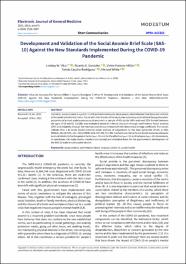Development and Validation of the Social Anomie Brief Scale (SAS10) Against the New Standards Implemented During the COVID-19 Pandemic

View/
Download
(application/pdf: 192.5Kb)
(application/pdf: 192.5Kb)
Date
2022-03-22Author(s)
Vilca, Lindsey W.
Gonzales, Ricardo D.
Pariona-Millán, Vivien
Caycho-Rodríguez, Tomás
White, Michael
Metadata
Show full item recordAbstract
“Currently, social anomie is a public health problem worldwide since people show behavior that does not conform
to the newly established norms. Faced with this, the aim of the study was to develop and validate the psychometric
properties of a short scale to assess social anomie in a sample of 406 adults (48% male and 52% female) between
the ages of 18 and 62. Validity was evaluated based on internal structure through confirmatory factor analysis
(CFA) and reliability through the internal consistency method with the hierarchical omega coefficient. The results
indicate that a bi-factor model presents better indexes of adjustment to the data (χ2=62.86; df=25; p=.000;
RMSEA=.061 [IC90% .042-.080]; SRMR=.024; CFI=.99; TLI=.99). Furthermore, the bi-factor model presents adequate
levels of reliability for the general factor (ωH=.70) and for the affective (ωhs=.32) and behavior (ωhs=.41) dimensions.
In conclusion, the study results provide a conceptual and statistical basis for the psychometric development of
the SAS-10 scale in subsequent studies.“
Collections
- Web of Science (WOS) [236]

